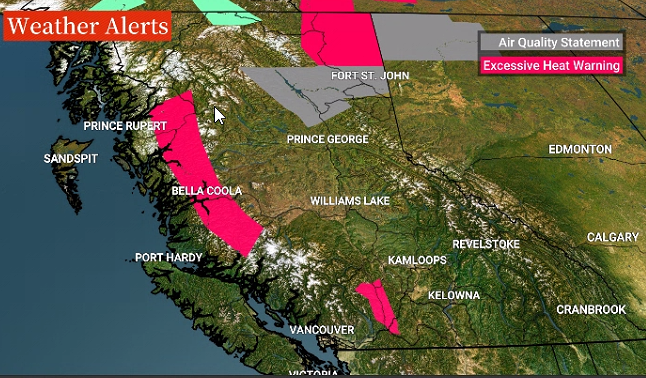With soaring temperatures in the forecast, Environment Canada has issued a heat warning for the Fraser Canyon, where the mercury is expected to reach 35 C on Wednesday.

“It will be hot for several days ahead. Temperatures are five to nine degrees above average for early July on most of the B.C. coast,” said Mark Madryga, Global BC’s chief meteorologist.
“South Okanagan especially, but all areas of the Southern Interior (will have) hot weather for quite a while, with 36 to 37 degrees in Oliver for the weekend.”

Two other regions are also under heat warnings on Wednesday — the North Coast, including the inland area and Kitimat, and the Fort Nelson region in northeastern B.C.
Both areas are expected to be around 30 C for much of the day.
It will be a hot day in the Lower Mainland as well, with temperatures forecast to be around 26 to 30 C, but no heat warning had been issued as of noon on Wednesday.


Get breaking National news
In addition to the heat, much of Vancouver Island, B.C.’s South Coast, the North Coast, and some of the Interior are at an extreme wildfire risk level.
Lightning is also possible for the Manning Park area and Princeton on Wednesday.
The hot weather is expected to last until next week, according to Environment Canada.
Elsewhere, Environment Canada has issued a special weather statement for large parts of the Yukon, including Whitehorse, where temperatures are expected to reach around 30 C.
The hot weather is expected to last from Thursday and throughout the weekend.
Also, a special air quality statement was issued for parts of northeastern B.C. due to wildfire smoke.
The smoky skies bulletin includes the Peace River region and stretches northward and includes Fort Nelson.

The B.C. government has offered a number of tips for community members in hot areas.
The province urges everyone to take serious precautions and to make sure those who are at the most risk are being taken care of. Those include:
- seniors aged 65 years or older
- people who live alone
- people with pre-existing health conditions such as diabetes, heart disease or respiratory disease
- people with mental illness such as schizophrenia, depression, or anxiety
- people with substance use disorders
- people who are marginally housed
- people who work in hot conditions
- people who are pregnant
- infants and young children
- people with limited mobility
More information can be read online at a B.C. government webpage.






Comments
Want to discuss? Please read our Commenting Policy first.